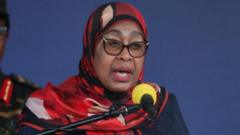Is Tanzania's Global Image Suffering Due to Poll Unrest?

Published: 2025-11-18 17:00:23 | Category: world
Tanzania's recent elections have raised significant concerns regarding the nation's stability, with President Samia Suluhu Hassan acknowledging that the unrest following the polls has "stained" the country's image. The political upheaval, which included violence and accusations of human rights abuses, has led to a strained relationship with international creditors and diminished credibility. With the opposition barred from contesting and hundreds reportedly killed during protests, the implications for Tanzania's governance and future economic support are substantial.
Last updated: 03 November 2023 (BST)
What’s happening now
The aftermath of Tanzania's October elections has been tumultuous, shattering the long-held perception of the nation as a bastion of stability in East Africa. President Samia Suluhu Hassan has recently spoken out about the violent protests that erupted following the elections, where she was declared the winner with an overwhelming 98% of the vote. However, with the opposition barred from participation, many have labelled the election a "mockery of democracy". Reports indicate severe clashes between security forces and protestors, leading to numerous deaths, though the government has yet to release an official death toll.
Key takeaways
- President Samia acknowledges a loss of credibility for Tanzania following election-related unrest.
- Opposition parties were barred from contesting, leading to accusations of a rigged election.
- Commonwealth envoy Lazarus Chakwera is set to facilitate reconciliation efforts.
- The government has initiated an investigation into the violence and is reviewing charges against protesters.
- President Samia warns of potential economic challenges due to the unrest.
Timeline: how we got here
The political landscape in Tanzania has shifted dramatically over recent months, culminating in the disputed elections held on 29 October 2023. Below is a brief timeline of key events leading up to this point:
- January 2021: Samia Suluhu Hassan assumes presidency following the death of John Magufuli.
- October 2023: Presidential elections held; Samia declared winner amid widespread opposition claims of a rigged process.
- November 2023: Protests erupt, resulting in violent clashes and a reported internet blackout lasting five days.
- November 2023: President Samia announces an investigation into the unrest and vows to reassess treason charges against protestors.
What’s new vs what’s known
New today/this week
President Samia has recently acknowledged the impact of the unrest on Tanzania's international standing and has initiated an investigation into the violence that marred the elections. She has also called for a review of charges against those detained during the protests, signalling a potential shift in the government's approach to dissent.
What was already established
The election results, which saw Samia win with a reported 98% of the vote, have been widely contested due to the exclusion of opposition parties. The opposition claims that the election was marred by violence, intimidation, and suppression of dissent, contributing to a growing sense of instability within the country.
Impact for the UK
Consumers and households
The unrest and subsequent loss of credibility may impact Tanzanian consumers, particularly if international loans and support are affected. Increased economic instability could lead to higher prices for essential goods and services, further straining household budgets.
Businesses and jobs
For UK businesses operating in Tanzania, the political instability could lead to higher risks in investment and operations. The potential for reduced international support may also affect local businesses reliant on foreign investment and trade partnerships, leading to a challenging economic environment.
Policy and regulation
The Tanzanian government may face increased scrutiny from international bodies regarding its handling of dissent and human rights. The potential for sanctions or reduced aid could prompt policy changes aimed at stabilising the political landscape and restoring Tanzania’s international standing.
Numbers that matter
- 98% - Percentage of votes Samia claimed in the recent elections.
- 240+ - Number of individuals charged with treason following the protests.
- >100 - Estimated number of deaths according to opposition claims; official figures remain unreleased.
- 5 - Duration of the internet blackout during protests.
- 27 - Total number of members in President Samia's newly appointed cabinet.
Definitions and jargon buster
- Treason: A serious crime that involves betraying one's country, often defined by acts against the government.
- Commonwealth: A political association of 54 member states, most of which are former territories of the British Empire.
- International creditors: Entities that lend money to countries, including foreign governments and financial institutions.
How to think about the next steps
Near term (0–4 weeks)
Over the coming weeks, it will be essential to monitor developments regarding the investigation into the protests and any changes in the government's approach to political dissent. The outcome of Lazarus Chakwera's reconciliation efforts could indicate a shift in the political climate.
Medium term (1–6 months)
In the medium term, the focus will likely be on economic recovery and the potential for international support. Observers should watch for any reforms aimed at restoring credibility and stabilising the political environment.
Signals to watch
- Official announcements regarding the investigation into the protests.
- Changes in international financial support or loans to Tanzania.
- Reactions from opposition leaders and civil society regarding government actions.
Practical guidance
Do
- Stay informed about developments in Tanzania's political landscape.
- Monitor communications from international bodies regarding Tanzania's human rights record.
- Consider the potential impact on investments in the region.
Don’t
- Ignore the implications of the unrest for economic stability.
- Assume that the situation will improve without significant reforms.
- Overlook the voices of opposition and civil society in Tanzania.
Checklist
- Review the latest news on political developments in Tanzania.
- Assess potential impacts on business operations and supply chains.
- Stay engaged with updates from international organisations monitoring the situation.
- Evaluate any travel plans to Tanzania based on current events.
- Consider humanitarian support options for those affected by the unrest.
Risks, caveats, and uncertainties
The situation in Tanzania remains fluid, with ongoing unrest and the potential for further violence. The official government stance may differ significantly from reports provided by opposition groups. As such, the true scale of the unrest and its implications may not be fully known for some time. Observers should remain cautious about drawing conclusions without comprehensive data from multiple sources.
Bottom line
Tanzania's political stability has been severely tested following the recent elections, with significant implications for its international credibility and economic future. Moving forward, both the government and the international community will need to engage in constructive dialogue to restore stability and address the underlying issues that led to the unrest.
FAQs
What were the main issues in Tanzania's recent elections?
The recent elections in Tanzania were marred by violence, with opposition parties barred from contesting, leading to accusations of a rigged process. President Samia Suluhu Hassan won with 98% of the vote, but many viewed the election as undemocratic.
How has the unrest affected Tanzania's international image?
The unrest has significantly stained Tanzania's image, eroding its credibility among international creditors and potentially impacting future financial support and investment.
What steps is the government taking to address the violence?
President Samia has called for an investigation into the unrest and has urged prosecutors to consider reducing charges for those not directly involved in the violence, signalling a potential shift towards reconciliation.



